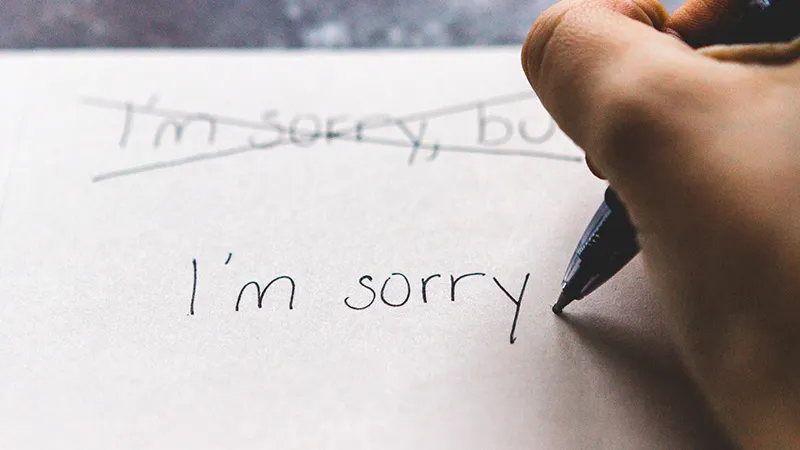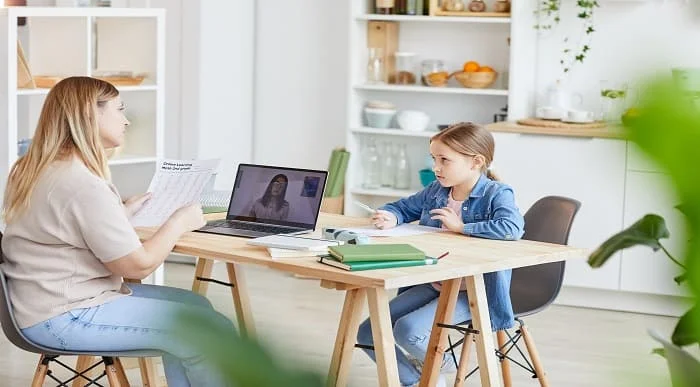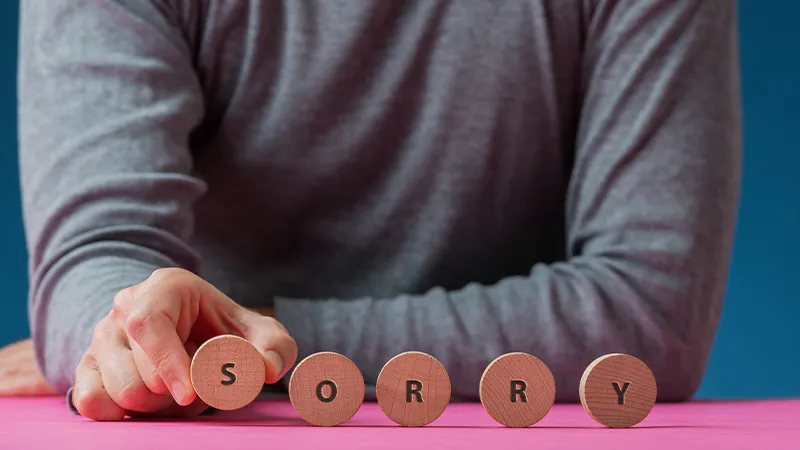Personal Development
How to be Apologetic – 20 Tips to be Apologetic
Who hasn’t been on the receiving end of a terrible apology?
- “Sorry, geez. I had no idea it would be such a big issue.”
- “Sorry, but you shouldn’t be so sensitive, I say.”
- “I’m sorry if I upset you. I was simply having fun.”
- “I’m sorry it happened, but I can’t truly take responsibility.”
As you reached here after searching for “how to be apologetic?” It’s reasonable to believe that you’ve made a mistake or hurt another person.
Here’s the good news: Learning to make a sincere apology isn’t as difficult as it may sound, and we’re here to help you find the best way to apologise.
 Are you looking for a Bereavement and Grief Counselling Diploma Online Course?
Are you looking for a Bereavement and Grief Counselling Diploma Online Course?
Table of Content
- What is the Apology?
- Why Do You Need to be Apologetic?
- How to be Apologetic? – 20 Tips to be Apologetic
- 1. Understand why you’re apologising.
- 2. Start with ‘I’m sorry.’ Period.
- 3. Explain the mistake you made.
- 4. Use kindness.
- 5. Make it all about you.
- 6. Understand the emotions of the other person.
- 7. Keep your attention on your actions rather than your intentions.
- 8. Take steps to make amends.
- 9. Don’t overdo it.
- 10. Ask for forgiveness
- 11. Understanding when not to apologise
- 12. Give up the idea of being “right.”
- 13. Keep your justifications out of it.
- 14. Do it in person.
- 15. Select a peaceful or private place for the apology.
- 16. Make sure you have enough time to have a complete conversation.
- 17. Use open, humble body language.
- 18. Tell them how you’ll change.
- 19. Give thanks at the end.
- 20. Let it go.
- FAQ
- What do you say to an apologetic person?
- What do you call a person who never apologises?
- What can I say instead of sorry?
- How do you deal with someone who never apologises?
- What does a sincere apology look like?
- Is being apologetic good?
- What is a proper apology?
- What is a genuine apology?
- How do you apologise in a meaningful way?
- How do you apologise in a text?
- Conclusion
- What to Read Next:
What is the Apology?
According to Wikipedia, an apology is an expression of regret or guilt for one’s actions. Whereas making an apology is the process of expressing regrets. It may be known as saying sorry in informal situations.
An apology has two essential elements. It:
- Shows your regret for your mistakes.
- Recognises the damage your actions may have caused to another person.
Why Do You Need to be Apologetic?
There are many genuine reasons to apologise when you have insulted or made a mistake about another person. By apologising, you can:
- Understand that you were wrong.
- Talk about what is and is not acceptable in your relationship.
- Express your regret and sadness.
- Learn from your mistakes and develop new ways to deal with tough situations.
- Open up a line of communication with the other person.
Building relationships with people you’ve hurt is much easier when you sincerely apologise to them. That may include colleagues, clients, friends, or family.
You can start a discussion with the other person by accepting your mistake. In this way, you can evaluate your behaviours and take responsibility for them.
Also, they can deal with their emotions, maintain their calmness, and stop blaming themselves for what happened.
Apologising for mistakes can help you improve future behaviour, keep your dignity, and gain your integrity.
Sometimes they won’t accept your apology right away. But since you made an effort to make amends for your mistake and did the right thing, you probably feel happy.

Behavioural Safety Course Online
How to be Apologetic? – 20 Tips to be Apologetic
The 20 tips below will help you craft a natural, heartfelt apology to anyone in your life.
1. Understand why you’re apologising.
In order to make a meaningful apology, you should have a solid understanding of what went wrong.
Sincere apologies, examples like “I’m sorry for anything I did wrong”, and other such sentiments typically don’t work very well. But they can also lead to more conflict.
Especially if you know you hurt someone, remembering your mistakes may well not seem all that good. You can avoid thinking about it if you already feel bad or are let down by yourself.
But keep in mind: Despite how bad you feel, the other person probably feels worse. It is even more unfair to them to ignore their sorrow.
Here’s an example of How to be apologetic
You gave a commitment to your roommates that you will help them change their bedroom furniture to make room for a new bookshelf. But unfortunately, you forget about the commitment. You immediately go to their room to apologise.
Instead of:
- “What did I do this time, all right? ”
- “Why are you acting so strange today? ”
Try: - “Our recent conversations seem to have changed a little, I’ve noticed. Did I do something to cause that? ”
- “I’d like to make things right because something feels off between us. I’m wondering if I did anything to cause that distance. ”
To make things even easier, here’s a small script for you-
“I’ve just remembered that I promised to help you move your furniture. So sorry again. Recently, work has been a little too much, so I entirely forgot about it. I know that you were desperate to finish that as soon as possible. Can I help you with it right now?”
Next, pay close attention to what they have to say.
2. Start with ‘I’m sorry.’ Period.
Apologies that contain qualifiers or justifications typically won’t get the job done.
Hint: It’s never a good idea to say “but” after saying “I’m sorry.”
When you justify your behaviour, you’re effectively shifting the responsibility. By doing this, you indicate that you don’t believe you have done anything wrong, and your apology comes out as fake.
Even sincere excuses can damage the genuineness of a sincere apology.
3. Explain the mistake you made.
Saying, “I’m sorry you got hurt”, is not acknowledging your mistake. Instead, say, “I’m sorry I called you naive” or “I’m sorry I pushed past you.” Be specific about your actions and why you ask for forgiveness for your behaviour.
Avoid blaming others for your behaviour. It’s not an apology to say, “I’m sorry you made me act that way.” Nobody has the power to control your response. You alone are responsible for your actions and words.
4. Use kindness.
Though it’s possible that your actions wouldn’t have hurt you, someone else was. Accept the truth for their emotions.
Try to see things from their perspective and let them know you understand their hurt. For example: “I’m sorry I arrived for dinner so late. I should have respected your time more because I realise it made you feel unimportant.”
Put yourself in their position when you apologise; most of the time, people get offended when you put yourself first.
5. Make it all about you.
If a fight has started out and you’re the first to realise you were wrong, keep your apology to yourself. Put less focus on what the other person did wrong or how they provoked your behaviour.
Everything you say will be undermined if you keep pointing out the other person’s faults. Also, demanding an equal apology. You should rethink your reasons for apologising in the first place if you’re only doing it to get them to say sorry as well.
6. Understand the emotions of the other person.
A good apology requires showing that you are aware of the effects of your actions on the other person. This tells them you understand why they feel hurt.
Say something like, “I understand you must have been really upset, angry, and confused.”
7. Keep your attention on your actions rather than your intentions.
Surely, you have no evil intentions.
However, in the end, the results of your actions often matter more than your intentions.
Because you wanted to protect your best buddy, you lied to them about their partner’s cheating.
However, by keeping this knowledge, you stopped them from making an informed choice about the relationship. Also, you broke their confidence, which also hurt them.
You can say that you only wished to protect them when you apologise. But after giving this justification, you should explain that your dishonesty ultimately had the opposite effect. Instead of focusing on your good intentions, your apology should be focused on the suffering you caused them.
8. Take steps to make amends.
Effective apologies involve making an effort to begin repairing the relationship.
In some cases, reparative behaviour is fairly clear. Such as:
- If you took your sister’s car without her permission and left it both inside and out dirty, you may be required to pay to have it cleaned and polished as part of your apologies.
- You can promise to stay late to fix your flaws if you rushed through a task and handed your boss a report with incorrect data.
You should also ask, “What can I do to set things right?” Then, show them you truly regret your actions by doing what they ask.
9. Don’t overdo it.
In general, the apology should be appropriate for the mistake. Excessive apologies or behaviour that goes above and beyond what they asked of you could help ease your guilt, but it won’t necessarily benefit the person you hurt.
It might even lead them to doubt your sincerity — after all, you didn’t listen to their request.
Please remember that the apology is for them, not you.
10. Ask for forgiveness
The apology should also include a request for forgiveness because it gives the person you insulted some control over the issue. In other words, asking for forgiveness shows the other person that you don’t take their forgiveness for granted.
11. Understanding when not to apologise
After mistakes or careless actions, being apologetic can improve relationships. However, apologising when you didn’t do anything wrong or only to escape a fight can hurt your self-worth and end up hurting you.
Consider this: If a friend, lover, or family member often expects you to take the blame for something you didn’t do, they aren’t owning up to their mistakes or making apologies for their wrongdoings.
Even when you believe that being the one to apologise first will inspire others to follow suit, it is still preferable to avoid taking responsibility when you were not to blame.
12. Give up the idea of being “right.”
Whether or whether you believe the other person’s feelings are “correct,” an apology must acknowledge their reality.
Think about the scenario when you go to the cinema alone. Your partner experienced hurt and rejection. Recognise that they were upset by your apologies rather than debating whether they are “right” to feel this way or whether you were “right” to go.
13. Keep your justifications out of it.
When explaining your behaviours to another person, it’s only reasonable to want to protect them. But if you give reasons, the other person might think you’re fake, which negates the point of your apology.
Top Courses of this Category
14. Do it in person.
When you apologise in person, it’s much easier to sound sincere. We communicate a lot through nonverbal signals like body language, gestures, and facial expressions. Whenever possible, apologise in person.
15. Select a peaceful or private place for the apology.
It takes a lot of personal effort to apologise. You can focus on the other person and overcome problems by finding a quiet, peaceful spot to apologise. Select a calm environment, and give yourself enough time so that you won’t feel pressured.
16. Make sure you have enough time to have a complete conversation.
Immediate apologies are usually unsuccessful because an apology has to do several things. First, you must fully own your mistake and explain what happened, express regret, and show that you will act differently in the future.
So, select a time when you won’t feel hurried or under pressure.
17. Use open, humble body language.
When you are making an apology, make sure you follow the given below steps to improve your body language:
- When speaking and listening, make eye contact.
- Avoid having your arms crossed.
- Try to maintain a relaxed expression.
- If you want to gesture, use open hands rather than closed hands.
18. Tell them how you’ll change.
Tell them what you’ll do to change and how you’ll change it. For example, if you’ve been late before, explain how you’d set an early alarm to be more on time instead of just apologising.
19. Give thanks at the end.
Explain that you do not want to damage or harm the relationship while expressing your thankfulness for the part they play in your life. This is the opportunity to express your love to loved ones and quickly think about the events that led to and supported the bond over time. Describe the absence of their friendship and trust in your life.
20. Let it go.
You don’t get to decide what happens next. No one owes you their forgiveness, even how difficult it may be to be open and honest in your apology. It cannot be gained in any way. Indeed, you don’t deserve forgiveness, but it is a gift nevertheless.
Don’t try to force someone to accept your apology. Instead, respect the other person’s decision if they don’t want the relationship to be rebuilt.
FAQ
What do you say to an apologetic person?
You can express gratitude by saying, “Thank you, I needed to hear this apology.
What do you call a person who never apologises?
When someone never apologises, we describe them as narcissists.
What can I say instead of sorry?
Instead of saying sorry, you can say my apologies, pardon me, excuse me, or my bad.
How do you deal with someone who never apologises?
The simplest way to deal with this is to accept their behaviour. Regardless of how annoying it may be. Also, understand that they are unable to apologise due to psychological reasons.
What does a sincere apology look like?
A sincere apology includes the phrase “I’m sorry” and is observed with the help of using the issue that happened. For example, “I’m sorry I hurt your feelings by not inviting you to the birthday party.”
Is being apologetic good?
Yes. Being apologetic is good. It helps repair relationships by making people comfortable with each other again.
What is a proper apology?
A proper apology is an apology that accepts the mistakes and makes an effort to show that you have learned from them.
What is a genuine apology?
A genuine apology shows that you are sorry for what you did and that you desire to make amends.
How do you apologise in a meaningful way?
Admitting your mistake, expressing your regret, and showing your understanding of the impact it had on the other person are all necessary for a meaningful way to apologise.
How do you apologise in a text?
Write “I’m sorry for” or “I apologise for,” then specify what you’re sorry about in the first sentence of your apology text. Remorse is best expressed up front as it shows humility and awareness of your impact on the other person.
Conclusion
Finally, keep in mind that learning how to be apologetic is a process that requires maintaining your dignity and improving your behaviour.
Despite your apology may start with words, it doesn’t end there.
Once you’ve apologised, you have the chance to follow through by expressing your intentions and making efforts to rebuild trust. Also, revisit your actions to look for more areas where you can improve.
When you make these changes sincerely, you may be able to earn forgiveness, but you can also stop yourself from making the same mistakes.
What to Read Next:















